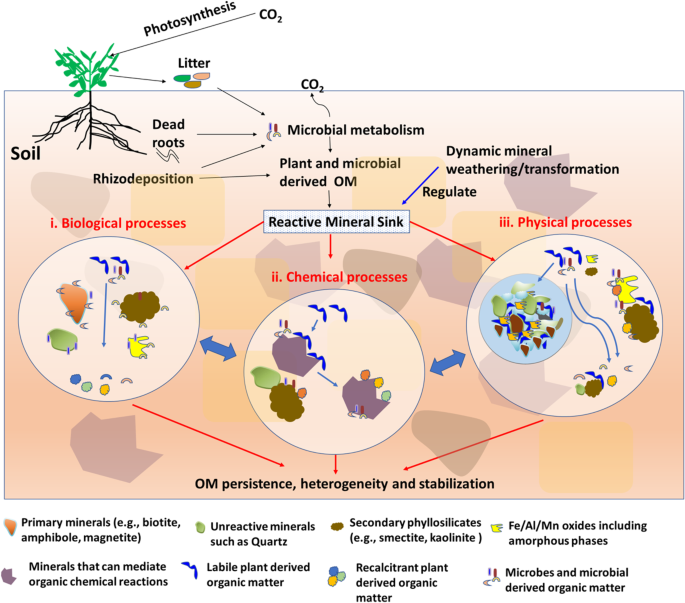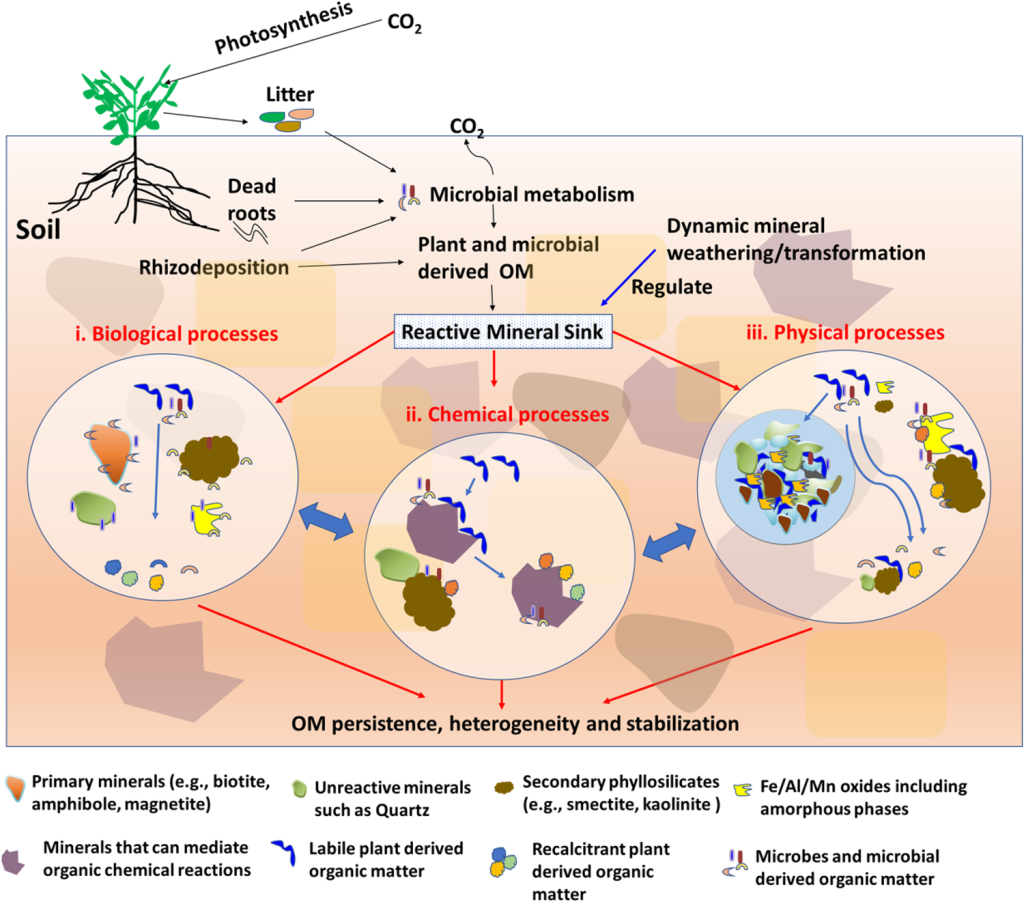Imagine the soil in your garden as a living, breathing entity that holds the key to thriving plants and bountiful harvests. The secret to unlocking this potential lies in the organic matter within that soil.
Have you ever wondered why some gardens flourish while others struggle to survive? The answer often lies beneath the surface, in the nutrients and life that organic matter brings to the soil. If you’re looking to transform your garden or simply want to understand how to nurture the land around you, understanding the role of organic matter is crucial.
It’s not just about having dirt under your nails; it’s about creating a foundation for life that supports everything from your backyard vegetables to the planet’s largest ecosystems. By diving into the world of organic matter, you’ll discover how you can enrich your soil, boost plant health, and even contribute to a more sustainable environment. Curious about how this natural magic works? Stick around to learn how incorporating organic matter into your soil can revolutionize your gardening experience and lead you to greener pastures.

Benefits Of Organic Matter
Organic matter plays a crucial role in enriching soil. It brings numerous benefits that significantly impact plant growth and soil health. Understanding these benefits can help gardeners and farmers improve their land’s productivity.
Improves Soil Structure
Organic matter enhances soil structure. It binds soil particles together, forming aggregates. This improves soil aeration and water retention. Better structure allows roots to penetrate deeper. Healthy roots lead to stronger plants.
Increases Nutrient Availability
Organic matter is rich in nutrients. It provides essential elements like nitrogen, phosphorus, and potassium. These nutrients are slowly released into the soil. Plants absorb them over time, ensuring steady growth.
Enhances Water Retention
Soil with organic matter retains water effectively. It acts like a sponge, soaking up moisture. This reduces the need for frequent watering. Plants have a consistent water supply, even during dry spells.
Promotes Microbial Activity
Organic matter fosters microbial activity. Microbes break down organic material, releasing nutrients. They also help in decomposing plant residues. This process enriches the soil further.
Reduces Soil Erosion
Organic matter helps prevent soil erosion. It stabilizes the soil surface. This reduces the risk of losing topsoil. Healthy soil remains intact, preserving its fertility.
Enhances Soil Ph Balance
Organic matter can buffer soil pH. It neutralizes excessive acidity or alkalinity. This creates a favorable environment for plant growth. Balanced pH supports nutrient uptake.
Improves Soil Fertility
Organic matter boosts soil fertility. It supplies a steady stream of nutrients. Fertile soil supports diverse plant life. It leads to higher crop yields and healthier gardens.

Impact On Soil Structure
Organic matter plays a key role in improving soil structure. It enhances water retention, promotes aeration, and fosters nutrient exchange. Healthy soil structure supports plant growth and prevents erosion.
Organic matter plays a crucial role in enhancing the soil structure. Imagine soil as a living entity; its structure determines how well plants can grow. When organic matter is added, it significantly impacts the soil’s texture, aeration, and water retention capabilities.Impact On Soil Texture
Organic matter, like decomposed leaves and compost, binds soil particles together. This binding improves the soil’s texture, making it more crumbly and easier to work with. Whether you’re planting a garden or maintaining a lawn, you’ll notice how effortlessly roots penetrate this improved soil.Improved Aeration
Air is vital for roots to breathe and grow. Organic matter creates spaces within the soil, enhancing aeration. This means your plants will have better access to oxygen, promoting healthy growth. Have you ever noticed how plants in well-composted soil seem to thrive effortlessly? That’s the magic of good aeration at work.Enhanced Water Retention
Water management is a challenge for many gardeners. Organic matter acts like a sponge, holding water in the soil. This ensures your plants have access to moisture even in dry spells. Consider the times you’ve seen soil crack under the sun; with organic matter, those cracks can be a thing of the past.Prevention Of Soil Erosion
Erosion can strip your soil of nutrients, leaving it barren. Organic matter strengthens the soil structure, reducing erosion. It acts as a natural glue, holding soil particles together during heavy rains. Have you ever thought about how much topsoil is lost during a storm? Adding organic matter can help prevent that loss.Supporting Soil Microorganisms
Your soil is teeming with life. Microorganisms play a vital role in breaking down organic matter, releasing nutrients. By enriching the soil with organic content, you support these beneficial organisms. Are you giving your soil the nutrients it needs to thrive? Incorporating organic matter into your soil isn’t just a gardening tip—it’s a vital step in ensuring sustainable plant growth. Have you considered how these changes could transform your gardening experience?Nutrient Cycling Enhancement
Organic matter enriches soil, supporting nutrient cycling by improving water retention and providing essential nutrients. This process enhances plant growth and maintains soil health. Healthy soil supports diverse ecosystems.
Healthy soil is the backbone of thriving ecosystems and abundant agriculture. One key element in this is organic matter, which significantly boosts nutrient cycling, a process essential for plant growth and soil fertility. By understanding how organic matter enhances nutrient cycling, you can better manage your garden or farm to produce more robust plants and richer yields. ###Nutrient Availability
Organic matter acts as a reservoir of nutrients. As it decomposes, it releases nutrients gradually, ensuring a steady supply for plants. This slow release prevents nutrient leaching, meaning fewer nutrients are washed away by rain. You might notice your plants looking healthier without constant fertilization. This is organic matter at work, making nutrients available when plants need them most. ###Microbial Activity
Soil is teeming with life, and organic matter fuels this microscopic community. Microbes break down organic material, releasing nutrients in forms plants can absorb. A garden rich in organic matter is like a bustling city for microbes, making your soil more alive and productive. Have you ever dug into a compost pile and felt the heat? That’s microbial activity in action, turning waste into wealth for your garden. ###Soil Structure Improvement
Organic matter improves soil structure, helping with nutrient retention. It binds soil particles into aggregates, creating spaces for air and water. Better structure means roots can penetrate deeper and access more nutrients. Think of it as giving plants a bigger pantry to explore. Next time you till your garden, notice how crumbly and easy-to-work the soil is after adding compost. That’s improved structure at play. ###Ph Regulation
The pH level of your soil affects nutrient availability. Organic matter can buffer soil pH, helping maintain a balance where nutrients are most accessible. A balanced pH means less need for chemical amendments. Have you ever wondered why some plants thrive while others struggle in the same soil? Often, it’s the organic matter balancing the pH, creating an optimal environment for nutrient uptake. ###Carbon Sequestration
Adding organic matter to soil doesn’t just enrich it; it also captures carbon, reducing greenhouse gases. This carbon acts like a sponge, holding nutrients and water. By enriching your soil with organic matter, you are not only growing healthier plants but also contributing to a healthier planet. Imagine your garden as a tiny carbon sink, playing a part in mitigating climate change. Incorporating organic matter into your soil management practices can vastly improve nutrient cycling. What changes can you make today to enhance your soil’s organic content? Whether it’s through composting kitchen scraps or leaving grass clippings on the lawn, the benefits are clear and far-reaching. So why wait? Start enriching your soil and watch as your plants—and the environment—flourish.Organic Matter In Sustainable Agriculture
Organic matter plays a crucial role in sustainable agriculture. It enriches the soil, improves its structure, and boosts fertility. Farmers who prioritize organic matter promote healthier ecosystems. This approach reduces the need for chemical fertilizers. It also supports biodiversity and enhances crop resilience. Let’s explore its benefits in sustainable agriculture.
Enhancing Soil Structure
Organic matter helps bind soil particles together. This creates better soil structure. It improves water retention and drainage. Plants grow stronger roots in well-structured soil. They absorb nutrients more effectively.
Boosting Nutrient Supply
Organic matter acts as a reservoir of nutrients. As it decomposes, it releases essential nutrients. Plants access these nutrients for growth and development. This process minimizes the need for synthetic fertilizers.
Promoting Microbial Activity
Organic matter provides food for soil microbes. These microbes play a vital role in nutrient cycling. They break down organic matter, releasing nutrients. Healthy microbial activity enhances soil fertility.
Improving Water Management
Soils rich in organic matter retain water effectively. They reduce runoff and erosion. This helps in water conservation. During dry spells, plants have access to moisture.
Supporting Crop Resilience
Organic matter improves soil health. Healthy soil supports resilient crops. These crops withstand pests and diseases better. They adapt to changing weather conditions.

Conclusion
Organic matter plays a vital role in soil health. It improves soil structure, aiding water retention and air circulation. Essential nutrients are added to the soil, supporting plant growth. Soil organisms thrive, enhancing nutrient availability. This leads to richer, more fertile soil.
Sustainable practices like composting boost organic matter levels. They contribute to a healthier ecosystem. Understanding this process aids in smart farming and gardening. Focusing on organic matter benefits both crops and the environment. Embrace these practices for better soil and healthier plants.
Discover the power of nature in enriching soil.



